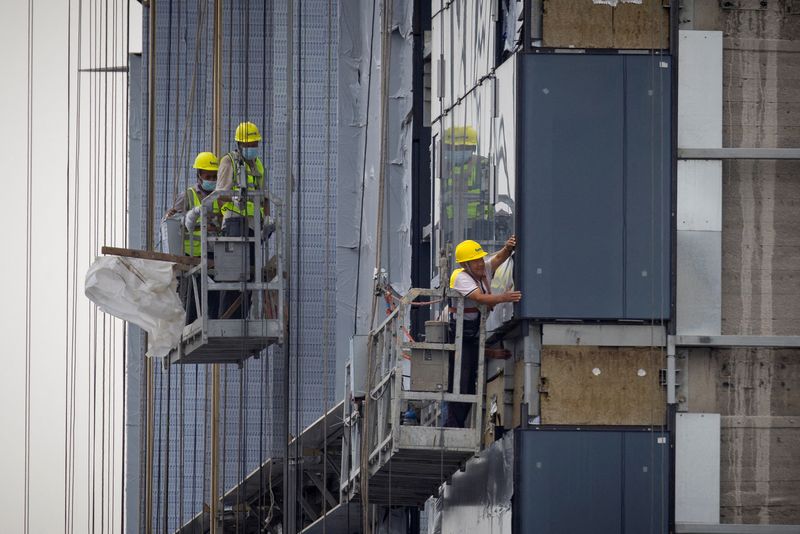By Clare Jim
HONG KONG (Reuters) -Shares of Chinese property developers jumped on Thursday, after a report that China is considering a plan for local governments nationwide to buy millions of unsold homes from distressed companies to ease a protracted property crisis.
Hong Kong's Hang Seng Mainland Properties Index firmed as much as 6% in morning trading.
State-backed Sino-Ocean Group surged more than 50% and defaulted private developers CIFI Holdings and Shimao Group jumped more than 30%.
Hong Kong's markets were closed on Wednesday for a public holiday. They have been catching up to gains in mainland property shares since the previous day.
China's CSI 300 Real Estate index climbed over 3% on Thursday, following a 2.2% rise on Wednesday.
Bloomberg News said on Wednesday the State Council is gathering feedback on the preliminary plan from various provinces and government bodies, after a meeting of the ruling Communist Party leaders in late April called for efforts to clear mounting housing inventory.
Local state-owned enterprises would be asked to help purchase unsold homes from distressed developers at steep discounts using loans provided by state banks, according to the report, which added that many of these homes would be converted into affordable housing.
China's property sector slipped into a debt crisis in mid-2021. Since 2022, waves of policy measures have failed to turn around the sector that represents around a fifth of the economy and remains a major drag on consumer spending and confidence.
POLICY RAMP-UP
Over the past years, some local governments have already announced plans to buy unfinished or unsold homes from developers and turn them into social housing.
Authorities also, in recent weeks, ramped up policies intended to clear the stock of unsold housing. Large cities like Beijing and Shenzhen have eased home purchase restrictions, with some allowing homebuyers to "swap" to a new home from an old one.
"We believe there is limited further action that the local governments can take on their own to support the property sector. It now comes to the central government to introduce meaningful measures for the property sector," Nomura said in a report.
If governments can acquire a meaningful volume of unsold homes from developers, it will help resolve the inventory issue and also channel fund flows to the credit-trapped private companies, said Nomura.
This, in turn, would support construction activities and alleviate the sector's downward spiral, it added.
DEMAND WORRIES
However, some have been concerned about the lack of housing demand in smaller cities, with worries surfacing that such a plan would further weigh on the financial health of local governments.
Local governments are already more than $9 trillion in debt and pose a major risk to China's economy and financial stability.
"It would only work in higher-tier cities but not lower-tier ones; where would the buyers come from?" said an analyst from another Asian bank, who declined to be named as he was not authorised to speak to the media.
"Telling local governments in those cities to buy inventory would just burn their balance sheet."

Goldman Sachs estimated this week that saleable housing inventory was valued at 13.5 trillion yuan ($1.87 trillion) at end-2023, and because some of their construction had not been completed, it would require 5 trillion yuan of capital investment to complete them.
($1 = 7.2151 Chinese yuan renminbi)